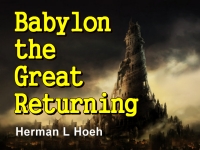Babylon the Great Returning

The presentation on this Holy Day I checked and found that Mr. Raymond McNair is not scheduled to speak and I was scheduled twice and I want to say for any of you who might have had plans, I will be speaking this morning here and I've asked him to speak in my place, which is only proper at the auditorium. I do not account for why he was left out, that's not my responsibility, but I didn't even know he was going to be here or we would have made some changes in advance. Anyway he chose to speak this afternoon because his favorite Bible is not with him, not that that's necessary. We do appreciate your presence here on this day.
Transcript of this Sermon coming.
Sermon Date: September 22, 1979






